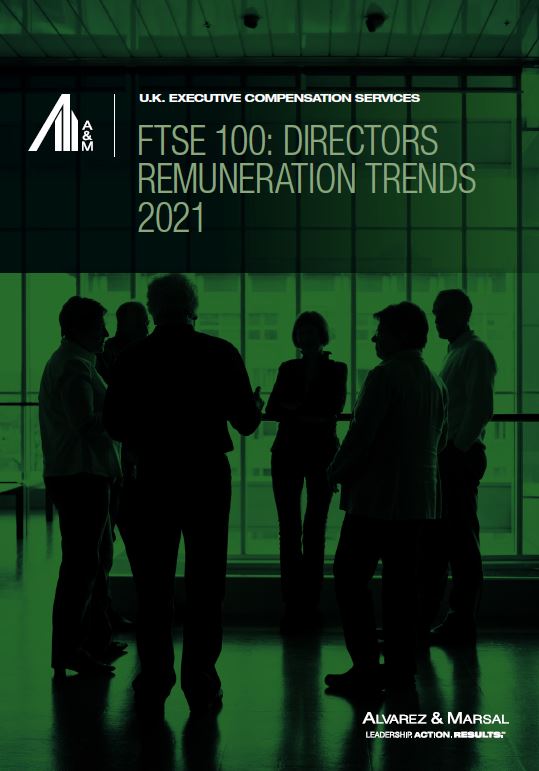FTSE 100: Directors’ Remuneration Trends 2021
Article featured in Proactive Investor, October 2021.
Article featured in ESG Clarity, October 2021.
Article featured in Financial Times, October 2021.
Article featured in Bloomberg News, October 2021.
2020/21 saw unprecedented disruption for the UK economy, businesses, and people, with the government required to intervene to protect jobs in many sectors. As the year came to a close, Remuneration Committees needed to make sound judgements to ensure that 2020/21 remuneration outcomes for senior executives were fair and proportionate and reflected the interests of all stakeholders. They also needed to consider whether and how to adapt remuneration policies and incentive structures to ensure that these reflected changing business priorities.
A&M’s analysis of pay levels in the FTSE 100 shows how the effects of the pandemic have been reflected in Executive Directors’ remuneration. Lower payments from bonus and long-term incentive plans, coupled with share price falls at many companies, have reduced the amounts earned by executives. As a result, around one-third of FTSE 100 CEOs have seen their take-home pay fall by 30% or more compared to the prior year.
This year we have seen a large number of companies make changes to their directors’ remuneration policies. More companies have adopted restricted share plans, reducing the challenge of setting long-term targets in return for lower quantum. Environmental, social, and governance (ESG) measures have also significantly increased in prevalence, in both annual bonus plans and long-term incentives. The economic turbulence has also resulted in an increased focus on cash flow and debt reduction metrics in annual bonus plans. We also see that strategic measures are increasingly being used in long-term incentives, with the weightings on traditional measures such as relative TSR and EPS being reduced.
A&M’s annual report on FTSE 100 Directors’ Remuneration
A&M’s analysis of FTSE 100 directors remuneration is based on Annual Reports published up to the end of June 2021, provides a clear overview of the key trends in executive remuneration, including:
- Remuneration policy changes
- The adoption of environmental, social, and governance (ESG) metrics
- Alignment of directors' pensions to the workforce level
- Post-cessation shareholding policies
- The replacement of performance share plans with restricted share plans
- Pay outcomes and the impact of the pandemic's effects on the CEO pay ratio
The full report also includes a quick reference guide, providing a quartile analysis of the following:
- Base salary
- Employer pension allowance
- Annual bonus
- Long-term incentive
- Target total remuneration
- The single figure of total remuneration
- Shareholding requirements
 Click here to download the report.
Click here to download the report.





